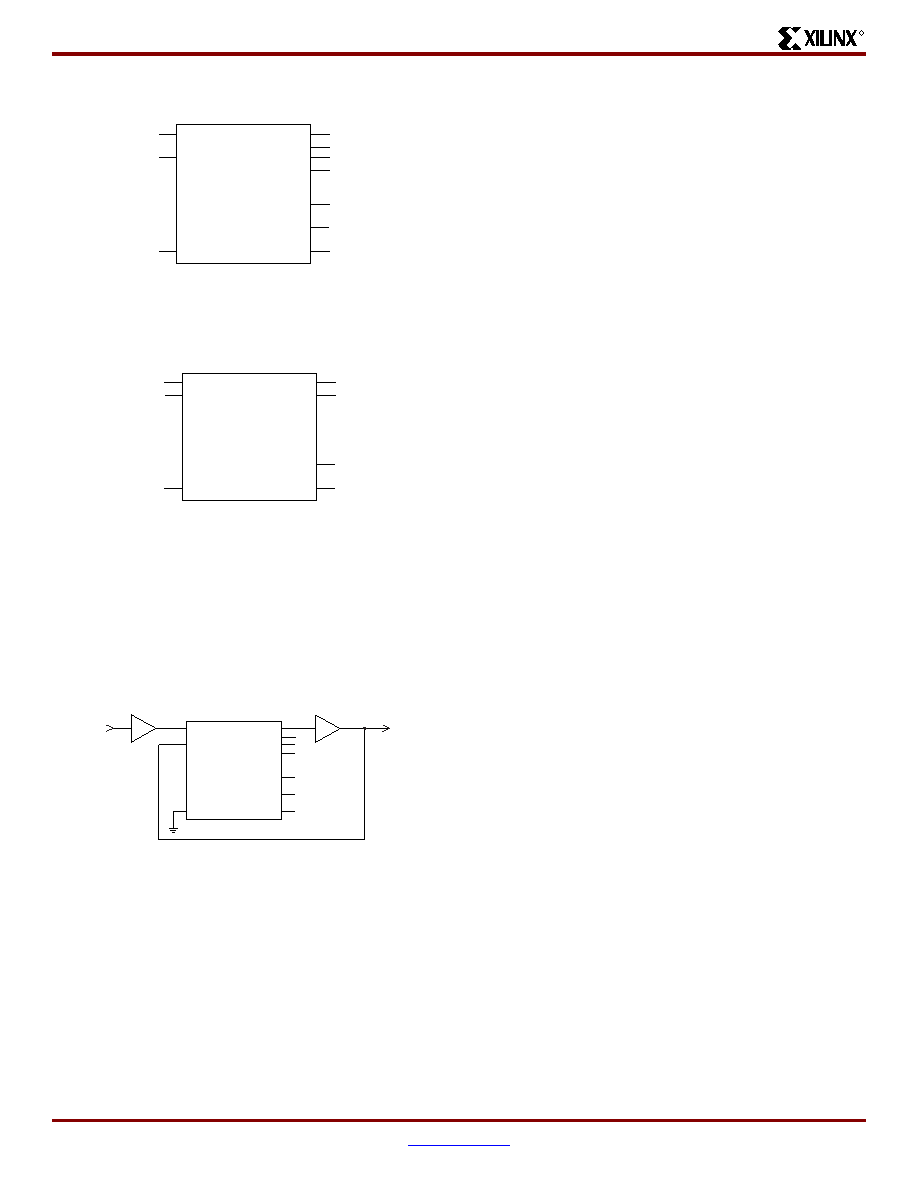- 您現(xiàn)在的位置:買(mǎi)賣(mài)IC網(wǎng) > PDF目錄4193 > XCV2000E-7FG1156C (Xilinx Inc)IC FPGA 1.8V C-TEMP 1156-FBGA PDF資料下載
參數(shù)資料
| 型號(hào): | XCV2000E-7FG1156C |
| 廠商: | Xilinx Inc |
| 文件頁(yè)數(shù): | 153/233頁(yè) |
| 文件大?。?/td> | 0K |
| 描述: | IC FPGA 1.8V C-TEMP 1156-FBGA |
| 產(chǎn)品變化通告: | FPGA Family Discontinuation 18/Apr/2011 |
| 標(biāo)準(zhǔn)包裝: | 1 |
| 系列: | Virtex®-E |
| LAB/CLB數(shù): | 9600 |
| 邏輯元件/單元數(shù): | 43200 |
| RAM 位總計(jì): | 655360 |
| 輸入/輸出數(shù): | 804 |
| 門(mén)數(shù): | 2541952 |
| 電源電壓: | 1.71 V ~ 1.89 V |
| 安裝類(lèi)型: | 表面貼裝 |
| 工作溫度: | 0°C ~ 85°C |
| 封裝/外殼: | 1156-BBGA |
| 供應(yīng)商設(shè)備封裝: | 1156-FBGA(35x35) |
第1頁(yè)第2頁(yè)第3頁(yè)第4頁(yè)第5頁(yè)第6頁(yè)第7頁(yè)第8頁(yè)第9頁(yè)第10頁(yè)第11頁(yè)第12頁(yè)第13頁(yè)第14頁(yè)第15頁(yè)第16頁(yè)第17頁(yè)第18頁(yè)第19頁(yè)第20頁(yè)第21頁(yè)第22頁(yè)第23頁(yè)第24頁(yè)第25頁(yè)第26頁(yè)第27頁(yè)第28頁(yè)第29頁(yè)第30頁(yè)第31頁(yè)第32頁(yè)第33頁(yè)第34頁(yè)第35頁(yè)第36頁(yè)第37頁(yè)第38頁(yè)第39頁(yè)第40頁(yè)第41頁(yè)第42頁(yè)第43頁(yè)第44頁(yè)第45頁(yè)第46頁(yè)第47頁(yè)第48頁(yè)第49頁(yè)第50頁(yè)第51頁(yè)第52頁(yè)第53頁(yè)第54頁(yè)第55頁(yè)第56頁(yè)第57頁(yè)第58頁(yè)第59頁(yè)第60頁(yè)第61頁(yè)第62頁(yè)第63頁(yè)第64頁(yè)第65頁(yè)第66頁(yè)第67頁(yè)第68頁(yè)第69頁(yè)第70頁(yè)第71頁(yè)第72頁(yè)第73頁(yè)第74頁(yè)第75頁(yè)第76頁(yè)第77頁(yè)第78頁(yè)第79頁(yè)第80頁(yè)第81頁(yè)第82頁(yè)第83頁(yè)第84頁(yè)第85頁(yè)第86頁(yè)第87頁(yè)第88頁(yè)第89頁(yè)第90頁(yè)第91頁(yè)第92頁(yè)第93頁(yè)第94頁(yè)第95頁(yè)第96頁(yè)第97頁(yè)第98頁(yè)第99頁(yè)第100頁(yè)第101頁(yè)第102頁(yè)第103頁(yè)第104頁(yè)第105頁(yè)第106頁(yè)第107頁(yè)第108頁(yè)第109頁(yè)第110頁(yè)第111頁(yè)第112頁(yè)第113頁(yè)第114頁(yè)第115頁(yè)第116頁(yè)第117頁(yè)第118頁(yè)第119頁(yè)第120頁(yè)第121頁(yè)第122頁(yè)第123頁(yè)第124頁(yè)第125頁(yè)第126頁(yè)第127頁(yè)第128頁(yè)第129頁(yè)第130頁(yè)第131頁(yè)第132頁(yè)第133頁(yè)第134頁(yè)第135頁(yè)第136頁(yè)第137頁(yè)第138頁(yè)第139頁(yè)第140頁(yè)第141頁(yè)第142頁(yè)第143頁(yè)第144頁(yè)第145頁(yè)第146頁(yè)第147頁(yè)第148頁(yè)第149頁(yè)第150頁(yè)第151頁(yè)第152頁(yè)當(dāng)前第153頁(yè)第154頁(yè)第155頁(yè)第156頁(yè)第157頁(yè)第158頁(yè)第159頁(yè)第160頁(yè)第161頁(yè)第162頁(yè)第163頁(yè)第164頁(yè)第165頁(yè)第166頁(yè)第167頁(yè)第168頁(yè)第169頁(yè)第170頁(yè)第171頁(yè)第172頁(yè)第173頁(yè)第174頁(yè)第175頁(yè)第176頁(yè)第177頁(yè)第178頁(yè)第179頁(yè)第180頁(yè)第181頁(yè)第182頁(yè)第183頁(yè)第184頁(yè)第185頁(yè)第186頁(yè)第187頁(yè)第188頁(yè)第189頁(yè)第190頁(yè)第191頁(yè)第192頁(yè)第193頁(yè)第194頁(yè)第195頁(yè)第196頁(yè)第197頁(yè)第198頁(yè)第199頁(yè)第200頁(yè)第201頁(yè)第202頁(yè)第203頁(yè)第204頁(yè)第205頁(yè)第206頁(yè)第207頁(yè)第208頁(yè)第209頁(yè)第210頁(yè)第211頁(yè)第212頁(yè)第213頁(yè)第214頁(yè)第215頁(yè)第216頁(yè)第217頁(yè)第218頁(yè)第219頁(yè)第220頁(yè)第221頁(yè)第222頁(yè)第223頁(yè)第224頁(yè)第225頁(yè)第226頁(yè)第227頁(yè)第228頁(yè)第229頁(yè)第230頁(yè)第231頁(yè)第232頁(yè)第233頁(yè)

Virtex-E 1.8 V Field Programmable Gate Arrays
R
Module 2 of 4
DS022-2 (v3.0) March 21, 2014
20
Production Product Specification
— OBSOLETE — OBSOLETE — OBSOLETE — OBSOLETE —
BUFGDLL Pin Descriptions
Use the BUFGDLL macro as the simplest way to provide
zero propagation delay for a high-fanout on-chip clock from
an external input. This macro uses the IBUFG, CLKDLL and
BUFG primitives to implement the most basic DLL applica-
tion as shown in Figure 24.
This symbol does not provide access to the advanced clock
domain controls or to the clock multiplication or clock divi-
sion features of the DLL. This symbol also does not provide
access to the RST, or LOCKED pins of the DLL. For access
to these features, a designer must use the library DLL prim-
itives described in the following sections.
Source Clock Input — I
The I pin provides the user source clock, the clock signal on
which the DLL operates, to the BUFGDLL. For the BUFG-
DLL macro the source clock frequency must fall in the low
frequency range as specified in the data sheet. The BUFG-
DLL requires an external signal source clock. Therefore,
only an external input port can source the signal that drives
the BUFGDLL I pin.
Clock Output — O
The clock output pin O represents a delay-compensated
version of the source clock (I) signal. This signal, sourced by
a global clock buffer BUFG symbol, takes advantage of the
dedicated global clock routing resources of the device.
The output clock has a 50-50 duty cycle unless you deacti-
vate the duty cycle correction property.
CLKDLL Primitive Pin Descriptions
The library CLKDLL primitives provide access to the com-
plete set of DLL features needed when implementing more
complex applications with the DLL.
Source Clock Input — CLKIN
The CLKIN pin provides the user source clock (the clock
signal on which the DLL operates) to the DLL. The CLKIN
frequency must fall in the ranges specified in the data sheet.
A global clock buffer (BUFG) driven from another CLKDLL,
one of the global clock input buffers (IBUFG), or an
IO_LVDS_DLL pin on the same edge of the device (top or
bottom) must source this clock signal. There are four
IO_LVDS_DLL input pins that can be used as inputs to the
DLLs. This makes a total of eight usable input pins for DLLs
in the Virtex-E family.
Feedback Clock Input — CLKFB
The DLL requires a reference or feedback signal to provide
the delay-compensated output. Connect only the CLK0 or
CLK2X DLL outputs to the feedback clock input (CLKFB)
pin to provide the necessary feedback to the DLL. The feed-
back clock input can also be provided through one of the fol-
lowing pins.
IBUFG - Global Clock Input Pad
IO_LVDS_DLL - the pin adjacent to IBUFG
If an IBUFG sources the CLKFB pin, the following special
rules apply.
1.
An external input port must source the signal that drives
the IBUFG I pin.
2.
The CLK2X output must feedback to the device if both
the CLK0 and CLK2X outputs are driving off chip
devices.
3.
That signal must directly drive only OBUFs and nothing
else.
These rules enable the software determine which DLL clock
output sources the CLKFB pin.
Reset Input — RST
When the reset pin RST activates the LOCKED signal deac-
tivates within four source clock cycles. The RST pin, active
High, must either connect to a dynamic signal or tied to
Figure 22: Standard DLL Symbol CLKDLL
Figure 23: High Frequency DLL Symbol CLKDLLHF
Figure 24: BUFGDLL Schematic
CLK0
CLK90
CLK180
CLK270
CLK2X
CLKDV
LOCKED
CLKIN
CLKFB
RST
ds022_26_121099
CLKDLL
CLK0
CLK180
CLKDV
LOCKED
CLKIN
CLKFB
RST
ds022_027_121099
CLKDLLHF
CLK0
CLK90
CLK180
CLK270
CLK2X
CLKDV
LOCKED
CLKIN
CLKFB
RST
ds022_28_121099
CLKDLL
BUFG
IBUFG
O
I
O
I
相關(guān)PDF資料 |
PDF描述 |
|---|---|
| IDT71V016SA12BFG8 | IC SRAM 1MBIT 12NS 48FBGA |
| XCV2000E-6FG1156I | IC FPGA 1.8V I-TEMP 1156-FBGA |
| XC4VFX140-10FFG1517C | IC FPGA VIRTEX-4FX 140K 1517FBGA |
| AYM36DTBT-S664 | CONN EDGECARD 72POS R/A .156 |
| XC5VTX150T-1FFG1156I | IC FPGA VIRTEX5TXT 150K 1156FBGA |
相關(guān)代理商/技術(shù)參數(shù) |
參數(shù)描述 |
|---|---|
| XCV2000E-7FG1156I | 功能描述:IC FPGA 1.8V I-TEMP 1156-FBGA RoHS:否 類(lèi)別:集成電路 (IC) >> 嵌入式 - FPGA(現(xiàn)場(chǎng)可編程門(mén)陣列) 系列:Virtex®-E 產(chǎn)品變化通告:XC4000(E,L) Discontinuation 01/April/2002 標(biāo)準(zhǔn)包裝:24 系列:XC4000E/X LAB/CLB數(shù):100 邏輯元件/單元數(shù):238 RAM 位總計(jì):3200 輸入/輸出數(shù):80 門(mén)數(shù):3000 電源電壓:4.5 V ~ 5.5 V 安裝類(lèi)型:表面貼裝 工作溫度:-40°C ~ 100°C 封裝/外殼:120-BCBGA 供應(yīng)商設(shè)備封裝:120-CPGA(34.55x34.55) |
| XCV2000E-7FG240C | 制造商:XILINX 制造商全稱(chēng):XILINX 功能描述:Virtex⑩-E 1.8 V Field Programmable Gate Arrays |
| XCV2000E-7FG240I | 制造商:XILINX 制造商全稱(chēng):XILINX 功能描述:Virtex⑩-E 1.8 V Field Programmable Gate Arrays |
| XCV2000E-7FG680C | 功能描述:IC FPGA 1.8V C-TEMP 680-FBGA RoHS:否 類(lèi)別:集成電路 (IC) >> 嵌入式 - FPGA(現(xiàn)場(chǎng)可編程門(mén)陣列) 系列:Virtex®-E 產(chǎn)品變化通告:XC4000(E,L) Discontinuation 01/April/2002 標(biāo)準(zhǔn)包裝:24 系列:XC4000E/X LAB/CLB數(shù):100 邏輯元件/單元數(shù):238 RAM 位總計(jì):3200 輸入/輸出數(shù):80 門(mén)數(shù):3000 電源電壓:4.5 V ~ 5.5 V 安裝類(lèi)型:表面貼裝 工作溫度:-40°C ~ 100°C 封裝/外殼:120-BCBGA 供應(yīng)商設(shè)備封裝:120-CPGA(34.55x34.55) |
| XCV2000E-7FG680I | 功能描述:IC FPGA 1.8V I-TEMP 680-FBGA RoHS:否 類(lèi)別:集成電路 (IC) >> 嵌入式 - FPGA(現(xiàn)場(chǎng)可編程門(mén)陣列) 系列:Virtex®-E 產(chǎn)品變化通告:XC4000(E,L) Discontinuation 01/April/2002 標(biāo)準(zhǔn)包裝:24 系列:XC4000E/X LAB/CLB數(shù):100 邏輯元件/單元數(shù):238 RAM 位總計(jì):3200 輸入/輸出數(shù):80 門(mén)數(shù):3000 電源電壓:4.5 V ~ 5.5 V 安裝類(lèi)型:表面貼裝 工作溫度:-40°C ~ 100°C 封裝/外殼:120-BCBGA 供應(yīng)商設(shè)備封裝:120-CPGA(34.55x34.55) |
發(fā)布緊急采購(gòu),3分鐘左右您將得到回復(fù)。